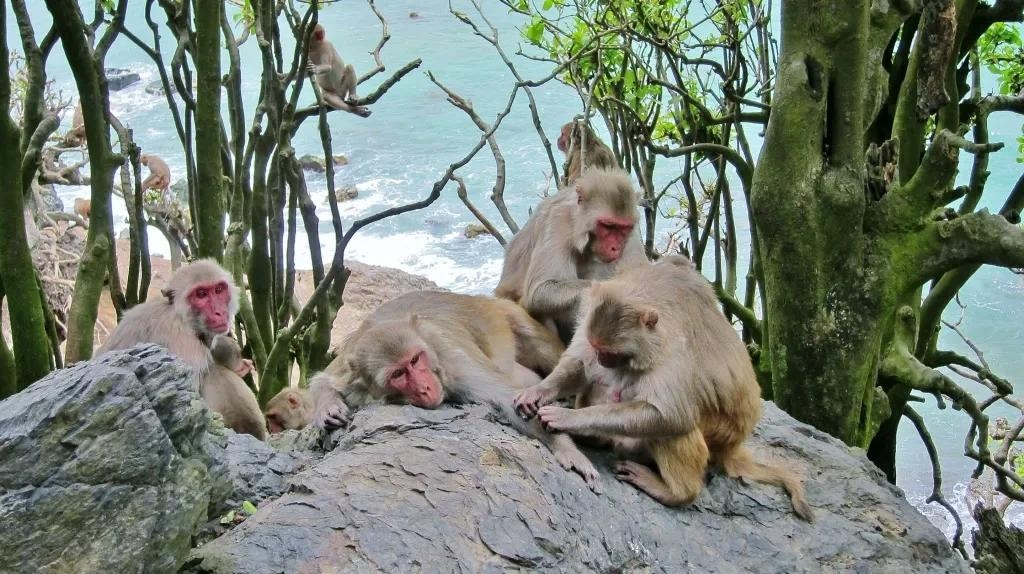For the first time, researchers demonstrate that monkeys with a more social nature—those that groom or are groomed more frequently and with more grooming partners—have a better gut microbiome.
 Grooming rhesus macaques on Cayo Santiago. Image credit: Lauren Brent
Grooming rhesus macaques on Cayo Santiago. Image credit: Lauren Brent
For instance, they have less of the normally pathogenic bacteria Streptococcus and more of the helpful microbes Faecalibacterium and Prevotella. This provides more proof that social connectivity in monkeys correlates with both good physical and mental health and vice versa.
In social animals like humans and other primates, social relationships are crucial for optimal health and wellbeing. Additionally, there is mounting proof that the gut microbiome, via the so-called “gut-brain axis,” is important for maintaining both physical and mental health and that bacteria can be spread socially, such as through touch.
What impact does social connectivity have on the variety and makeup of the gut microbiome, then? This is the subject of a recent study on rhesus macaques, Macaca mulatta, published in Frontiers in Microbiology.
Here we show that more sociable monkeys have a higher abundance of beneficial gut bacteria, and a lower abundance of potentially disease-causing bacteria.”
Dr Katerina Johnson, Study Lead Author and Research Associate, Departments of Experimental Psychology and Psychiatry, University of Oxford
Monkey island
On the island of Cayo Santiago, off the eastern coast of Puerto Rico, the researchers concentrated on a single social group of rhesus macaques (consisting of 22 males and 16 females between the ages of six and 20 years). Originally, macaques could be found exclusively in North Africa and Asia.
However, 409 rhesus macaques were sent from India to Cayo Santiago as part of the founding population in 1938. Currently, a total of 1,000 macaques from various social groups coexist on the 15.2-hectare island. Despite daily additions of monkey chow to their diet, they roam and graze freely. Every year, researchers observe the monkeys’ behavior.
A total of 50 uncontaminated stool samples were taken from this social group between 2012 and 2013. The amount of time each monkey spent grooming or being groomed and the number of grooming partners they had were utilized by the researchers as indicators of social connectivity.
Social grooming
Macaques are highly social animals and grooming is their main way of making and maintaining relationships, so grooming provides a good indicator of social interactions.”
Dr Karli Watson, Study Co-author, Institute of Cognitive Science, University of Colorado Boulder
Johnson, Watson, et al. examined the association between social connectivity and DNA sequence data from stool samples to determine the diversity and composition of the gut microbial population.
In addition, they considered factors like sex, age, season, and position within the group’s hierarchy. They concentrated on microorganisms that have consistently been demonstrated to be more or less prevalent in humans or rodents with autistic-like symptoms (often associated with social detachment) or that are socially isolated.
Sociable monkeys have more “good” microbes
Engagement in social interactions was positively related to the abundance of certain gut microbes with beneficial immunological functions, and negatively related to the abundance of potentially pathogenic members of the microbiota.”
Dr Philip Burnet, Study Co-Author and Professor, Department of Psychiatry, University of Oxford
For instance, Faecalibacterium and Prevotella were genera that were more prevalent in the most sociable monkeys. On the other hand, less sociable monkeys had the largest density of the genus Streptococcus, which in humans can result in diseases like strep throat and pneumonia.
Johnson explains, “It is particularly striking that we find a strong positive relationship between the abundance of the gut microbe Faecalibacterium and how sociable the animals are. Faecalibacterium is well known for its potent anti-inflammatory properties and is associated with good health.”
Cause and effect?
But what underlies the connection between social support and the makeup of the gut microbiome? It might be difficult to distinguish between cause and effect.
Johnson details, “The relationship between social behavior and microbial abundances may be the direct result of social transmission of microbes, for example through grooming. It could also be an indirect effect, as monkeys with fewer friends may be more stressed, which then affects the abundance of these microbes. As well as behavior influencing the microbiome, we also know it is a reciprocal relationship, whereby the microbiome can in turn affect the brain and behavior.”
“As our society is increasingly substituting online interactions for real-life ones, these important research findings underline the fact that as primates, we evolved not only in a social world but a microbial one as well,” stated Co-author Dr Robin Dunbar, a Professor from the Department of Experimental Psychology at the University of Oxford.
Source:
Journal reference:
Johnson, K. V.-A., et al. (2022) Sociability in a non-captive macaque population is associated with beneficial gut bacteria. Frontiers in Microbiology. doi.org/10.3389/fmicb.2022.1032495.